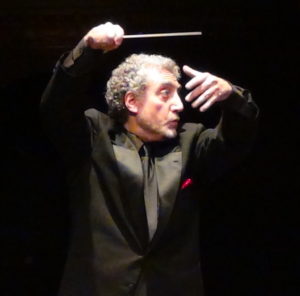Music Director and Conductor

Paul Phillips is Professor of Music and the Gretchen B. Kimball Director of Orchestral Studies at Stanford University, where he conducts the Stanford Symphony Orchestra, Stanford Philharmonia, Stanford New Ensemble, and Stanford Summer Symphony. With a repertoire of more than 1,000 works conducted in performance, including over 100 premieres, Phillips has appeared more than 80 orchestras, opera companies, choirs, and ballet troupes worldwide, including the San Francisco Symphony, Dallas Symphony, Netherlands Radio Chamber Orchestra and Choir, Orquesta Sinfónica de Salta and Orquesta Filarmońica de Río Negro (Argentina), Paul Taylor Dance Company, and Opera Providence. He is also an accomplished composer, pianist, and author. Prior to his appointment at Stanford in 2017, Phillips was Director of Orchestras and Chamber Music at Brown University in Rhode Island and Music Director/Conductor of the Pioneer Valley Symphony Orchestra and Chorus in Massachusetts. He is Music Advisor and an Honorary Patron of the International Anthony Burgess Foundation and served from 2022-2024 as President of the Western Region of CODA (College Orchestra Directors Association).
Phillips has conducted five recordings for Naxos with the RTÉ National Symphony Orchestra (Ireland), Slovak Philharmonic, and Brown University Orchestra, and also recorded with the Iceland Symphony Orchestra. His conducting honors include 11 ASCAP Awards for Adventurous Programming of Contemporary Music, 1st Prize in the NOS International Conductors Course (Holland) and Wiener Meisterkurse Conductors Course (Vienna), and selection for the Exxon/Arts Endowment Conductors Program.
Highlights of 2024 have included the premiere of Phillips’s newest composition, Sweet Thunder for 12 Pianos, a commission from Sunset Piano that premiered at San Francisco’s Grace Cathedral in February 2024, and publication of The Devil Prefers Mozart: On Music and Musicians, 1962-1993 by Anthony Burgess, a book “brilliantly edited and contextualised by Paul Phillips”, according to one review in the British press, and selected by the Financial Times as one of its three Best Summer Books of 2024 in Classical Music. During 2023-24, Phillips has conducted the California Orchestra Directors Association Honor Symphony Orchestra, Bay Area Rainbow Symphony, and Montecito Festival Orchestra at the Montecito International Music Festival.

After studies at Eastman, Columbia, and the University of Cincinnati College-Conservatory of Music, Phillips began his career in Germany as Conducting Assistant to Michael Gielen at the Frankfurt Opera and 1st Kapellmeister at Stadttheater Lüneburg. Upon his selection for the Exxon/Arts Endowment Conductors Program, he returned to the U.S., holding positions with the Greensboro Symphony, Greensboro Opera, Maryland Symphony, Savannah Symphony, and Savannah Symphony Chorale prior to appointments at Brown University and as Associate Conductor of the Rhode Island Philharmonic.
Leonard Bernstein, Michael Tilson Thomas, Kurt Masur, Seiji Ozawa, and Gunther Schuller are among the conductors with whom Phillips studied at Tanglewood, Aspen, the Salzburg Mozarteum, LA Philharmonic Institute, Music Academy of the West, and other festivals in the U.S. and Europe. In 2016, Phillips received the prestigious 2015 Harriet W. Sheridan Award for Distinguished Contribution to Teaching and Learning at Brown University.
An award-winning composer, Phillips has composed orchestral works, ballet, opera, choral music, song cycles, keyboard and chamber music, music for theatre, and works for young audiences. His chamber arrangement of Stravinsky’s opera Mavra, published by Boosey & Hawkes, has been performed by the Royal Opera House and at Glyndebourne and is featured in Bayerische Staatsoper’s Mavra/Iolanta, a 2022 DVD/Blu-ray Disc cited as a “Critic’s Choice” recording by Opera News (July 2023).
Phillips is the author of A Clockwork Counterpoint: The Music and Literature of Anthony Burgess, a groundbreaking examination of the work of the British composer-novelist. The book has been hailed in the press as “prodigiously researched, elegantly written” and “seamlessly fascinating”. He has also contributed essays to six other books about Burgess, including the Norton Critical Edition of A Clockwork Orange. As a music theorist, Phillips is best known for his article “The Enigma of Variations: A Study of Stravinsky’s Final Work for Orchestra” in Music Analysis, which is cited by Richard Taruskin in Stravinsky and the Russian Traditions as “the best exposition in print of Stravinsky’s serial methods.”
For further information, visit www.paulsphillips.com.

Connect with us